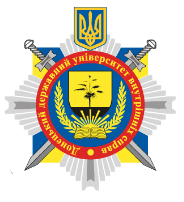ПРИНЦИП ПУБЛІЧНОСТІ КРИМІНАЛЬНО-ВИКОНАВЧОГО ПРАВА УКРАЇНИ
DOI:
https://doi.org/10.32782/2523-4269-2022-81-4-2-129-134Ключові слова:
публічність кримінально-виконавчого права, провідна роль посадових осіб установ виконання покарань, громадський контроль, критерій транспарентності, комплексний зміст.Анотація
Статтю присвячено визначенню принципу публічності у кримінально-виконавчому праві України. Наголошено на необхідності сприйняття цього принципу як невід’ємного складника системи кримінально-виконавчих засад. Зазначено, що цей принцип фактично відображено в змісті діяльності посадових осіб у межах кримінально-виконавчих правовідносин. При цьому цей принцип враховує як практичну діяльність посадових осіб органів й установ виконання покарань, так і інших органів державної влади, представників місцевого самоврядування, громадськості тощо.
Посилання
Шемшученко Ю.С. Юридична енциклопедія. Київ : Укр. енцикл., 1998. 744 с.
Бусел В.Т. Великий тлумачний словник сучасної української мови. Київ : ВТФ «Перун», 2005. 1728 с.
Роговенко Д.С. Правовий статус Рахункової палати України : дис. … канд. юрид. наук : спец. : 12.00.07. Ін-т законодавства Верховної Ради України. Київ, 2007. 201 с.
Дроздович Н. Принцип публічності кримінального процесу як гарантія незалежності судової діяльності. Слово Національної школи суддів України. 2016. № 1 (14). С. 96–104.
Рахунов Р.Д. Возбуждение уголовного дела в советском уголовном процессе. Москва : Госюриздат, 1954. 88 c.
Бандурин С.Г. Публичность как принцип уголовного судопроизводства и его действие в стадии возбуждения уголовного дела : дисс. … канд. юрид. наук : спец. : 12.00.09. Саратовский юрид. ин-т. Саратов, 2004. 209 c.
Ізарова І. Принцип публічності в цивільному процесі і його зміст. Вісник Київського національного університету імені Тараса Шевченка. Юридичні науки, 2011. № 89. С. 66–69.
Прохоров А.М. Большой энциклопедический словарь. Москва : Советская энциклопедия, 1991. 1628 с.
Маляренко В.Т. Перебудова кримінального процесу України в контексті європейських стандартів : теорія, історія і практика : дис. … д-ра юрид. наук : спец. : 12.00.09. Харків, 2004. 450 с.
Чельцов-Бебутов М.А. Уголовный процесс. Выпуск 2. Юрид. изд.-во МЮ СССР. Москва, 1948. 621с.
Строгович М.С. Курс советского уголовного процесса. Т. 1. Москва : Изд-во «Наука», 1968. 470 с.
Касаткина С.А. Публичность и диспозитивность в российском уголовном процессе. : дис. … канд. юрид. наук : спец. : 12.00.09. Москва, 2002. 255 с.
Демидов И.В. Принципы советского уголовного процесса. Москва : Юрид. Лит-ра, 1989. 640 с.
Тимощук В.П. Адміністративна процедура та адміністративні послуги : зарубіжний досвід і пропозиції для України. Київ : Факт, 2003. 496 с.
Тараненко С.М. Новий погляд на принципи захисту прав і свобод громадян у законодавстві про адміністративні проступки. Право України, 1999. № 9. C. 10–12.
Савченко Л.А. Правові основи фінансового контролю. Київ : Юрiнком Iнтер, 2008. 504 с.
Штефан М.Й. Цивільний процес. Київ : Ін Юре, 1997. 322 с.
Кряжков А.В. Публичный интерес: понятие, виды и защита. Государство и право. 1999. № 10. С. 92–97.
Закон України «Про прокуратуру» від 14.10.2014 № 1697-VII. URL: https://zakon.rada.gov.ua/laws/show/1697-18#Text.
Кримінально-виконавчий кодекс України : Закон від 11.07.2003 № 1129-IV. URL: https://zakon.rada.gov.ua/laws/show/1129-15#Text.
Про затвердження положень про спостережні комісії та піклувальні ради при спеціальних виховних установах : Постанова Кабінету Міністрів України від 01.04.2004 № 429. URL: https://zakon.rada.gov.ua/laws/show/429-2004-%D0%BF#Text.
Богацька А.В. Роль спостережних комісій як елементу контролю громадськості за дотриманням прав засуджених. URL: http://elar.naiau.kiev.ua/bitstream/123456789/13357/1/%D0%9F%D1%80%D0%BE%D0%B1.%20
%D1%82%D0%B0%20%D1%81%D1%82%D0%B0%D0%BD%20%D0%B4%D0%BE%D1%82%D1%80.%20
%D0%B7%D0%B0%D1%85%D0%B8%D1%81%D1%82._p143-144.pdf.
Шкута О.О. Деякі питання діяльності спостережної комісії як складової соціального партнерства пенітенціарної системи України. Право і суспільство. 2016. № 3. С. 177–182.





